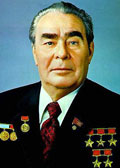 |
Леонид Ильич Брежнев (Leonid Il'ič Brežnev)b. 6/19 Dec 1906, Kamenskoe, Novomoskovsk district, Ekaterinoslav province, Russian Empire |
| Title: | Председатель Президиума Верховного Совета СССР (Chairman of the Presidium of the Supreme Soviet of the USSR) |
| Term: | 7 May 1960 - 15 Jul 1964 |
| Chronology: | 7 May 1960, elected, 5th session of the 5th USSR Supreme Soviet [1] |
| 15 Jul 1964, discharged, resolution passed by the 4th session of the 6th USSR Supreme Soviet [2] | |
| Term: | 16 Jun 1977 - 10 Nov 1982 |
| Chronology: | 16 Jun 1977, elected, 6th session of the 9th USSR Supreme Soviet [3] |
| 10 Nov 1982, died [4] |
| Biography: | |
| Born in a Russian family living in Ukraine, then part of the Russian Empire, Leonid Brežnev joined the All-Union Communist Party of Bolsheviks in 1931 as student of a technical institute. After graduating (1935), he worked as director of a technical school and then held a variety of local party posts, and by 1939 he had become secretary of the regional party committee of Dnepropetrovsk. In 1941-1946, Brežnev served as a political commissar in the Red Army, advancing in rank until he became a major general (1943) and head of the political commissars on the 4th Ukrainian front. In 1946-1950 he again held posts of the first secretary of the Zaporož'e and Dnepropetrovsk regional party committees. In 1950 he was sent to Moldavia as first secretary of the Central Committee of the Moldavian Communist Party (Jul 1950 - Oct 1952). His efforts to sovietize the Romanian population of Moldavia earned him promotion in Moscow and Brežnev was made a member of the party Central Committee (1952-1982), candidate member of its Presidium (16 Oct 1952 - 5 Mar 1953) and a secretary of the Central Committee (16 Oct 1952 - 5 Mar 1953). However, he was dismissed from the last two posts in the end of Stalin's rule and was appointed deputy head of the Political Department of the Soviet Army and Navy (Mar 1953 - Feb 1954). In 1954 he was made second secretary (Feb 1954 - Aug 1955) of the Central Committee of the Kazakstan Communist Party and later promoted to first secretary (Aug 1955 - 6 Mar 1956) for implementation of the Virgin and Idle Lands Campaign. Brežnev was reinstated as candidate member of the Presidium (27 Feb 1956 - 29 Jun 1957) and secretary of the Central Committee (27 Feb 1956 - 16 Jul 1960). After he had loyally worked against the "antiparty group" that attempted to remove Nikita Hruščëv, Brežnev was made a full member of the Presidium (29 Jun 1957 - 29 Mar 1966). On 7 May 1960, he was elected chairman of the Presidium of the Supreme Soviet and gave up his membership in the party secretariat, but in three years returned to this body again as secretary (22 Jun 1963 - 14 Oct 1964). In July 1964 he resigned the post in the Supreme Soviet to become Hruščëv's assistant and de facto "second" secretary of the Central Committee. Brežnev helped lead the coalition that forced Hruščëv from power, and was elected first secretary of the Central Committee (14 Oct 1964 - 29 Mar 1966). He consolidated his power during the 23rd party congress and was elected general secretary (8 Apr 1966 - 10 Nov 1982). Sharing the power with premier Aleksej Kosygin in 1964-1968, Brežnev was gradually increasing his authority and by the early 1970s was first among equals. By the mid-1970s he emerged as the national leader and assumed absolute authority. He forced to resign chairman of the Presidium of the Supreme Soviet Nikolaj Podgornyjj and was elected to that post himself on 16 Jun 1977. The same year he promoted adoption of the third constitution of the Soviet Union. Afterward he went into physical and political decline and died in office on 10 Nov 1982. Biography source: [5, p. 232] | |
| | |
| [1] | Ведомости Верховного Совета СССР, 1960, № 18, Ст. 139. |
| [2] | Ведомости Верховного Совета СССР, 1964, № 29, Ст. 343. |
| [3] | Ведомости Верховного Совета СССР, 1977, № 25, Ст. 385. |
| [4] | Правда, 1982, 11 ноября. |
| [5] | Государственная власть СССР. Высшие органы власти и управления и их руководители. 1923-1991 гг. Историко-биографический справочник / Сост. В.И.Ивкин. М.: РОССПЭН, 1999, |
Last update: 29 Nov 2023
